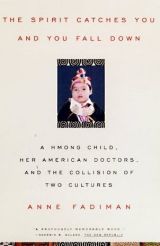


|
|
The Spirit Catches You and You Fall Down (Paperback)
by Anne Fadiman
| Category:
cross cultural insights, global and cultural issues, immigration |
| Market price: ¥ 178.00
MSL price:
¥ 148.00
[ Shop incentives ]
|
| Stock:
Pre-order item, lead time 3-7 weeks upon payment [ COD term does not apply to pre-order items ] |
MSL rating:
 Good for Gifts Good for Gifts |
| If you want us to help you with the right titles you're looking for, or to make reading recommendations based on your needs, please contact our consultants. |

Detail |

Author |

Description |

Excerpt |

Reviews |
|
|
|
Author: Anne Fadiman
Publisher: Farrar, Straus and Giroux; 1 edition
Pub. in: September, 1998
ISBN: 0374525641
Pages: 352
Measurements: 8.2 x 5.5 x 1.1 inches
Origin of product: USA
Order code: BA01417
Other information: 978-0374525644
|
|
Rate this product:
|
|
Anne Fadiman is the editor of The American Scholar. Recipient of a National Magazine Award for reporting and a John S. Knight Fellowship in Journalism, she has written for Civilization, Harper's, Life, and The New York Times, among other publications. She lives in New York City.
|
|
Winner of the National Book Critics Circle Award for NonfictionWhen three-month-old Lia Lee Arrived at the county hospital emergency room in Merced, California, a chain of events was set in motion from which neither she nor her parents nor her doctors would ever recover. Lia's parents, Foua and Nao Kao, were part of a large Hmong community in Merced, refugees from the CIA-run "Quiet War" in Laos. The Hmong, traditionally a close-knit and fiercely people, have been less amenable to assimilation than most immigrants, adhering steadfastly to the rituals and beliefs of their ancestors. Lia's pediatricians, Neil Ernst and his wife, Peggy Philip, cleaved just as strongly to another tradition: that of Western medicine. When Lia Lee Entered the American medical system, diagnosed as an epileptic, her story became a tragic case history of cultural miscommunication.Parents and doctors both wanted the best for Lia, but their ideas about the causes of her illness and its treatment could hardly have been more different. The Hmong see illness aand healing as spiritual matters linked to virtually everything in the universe, while medical community marks a division between body and soul, and concerns itself almost exclusively with the former. Lia's doctors ascribed her seizures to the misfiring of her cerebral neurons; her parents called her illness, qaug dab peg--the spirit catches you and you fall down--and ascribed it to the wandering of her soul. The doctors prescribed anticonvulsants; her parents preferred animal sacrifices.
|
From Amazon.com, USA
<2008-07-11 00:00>
Lia Lee was born in 1981 to a family of recent Hmong immigrants, and soon developed symptoms of epilepsy. By 1988 she was living at home but was brain dead after a tragic cycle of misunderstanding, overmedication, and culture clash: "What the doctors viewed as clinical efficiency the Hmong viewed as frosty arrogance." The Spirit Catches You and You Fall Down is a tragedy of Shakespearean dimensions, written with the deepest of human feeling. Sherwin Nuland said of the account, "There are no villains in Fadiman's tale, just as there are no heroes. People are presented as she saw them, in their humility and their frailty--and their nobility. |
Frances Reiher, USA
<2008-07-11 00:00>
A compelling anthropological study. The Hmong people in America are mainly refugee families who supported the CIA militaristic efforts in Laos. They are a clannish group with a firmly established culture that combines issues of health care with a deep spirituality that may be deemed primitive by Western standards. In Merced, CA, which has a large Hmong community, Lia Lee was born, the 13th child in a family coping with their plunge into a modern and mechanized way of life. The child suffered an initial seizure at the age of three months. Her family attributed it to the slamming of the front door by an older sister. They felt the fright had caused the baby's soul to flee her body and become lost to a malignant spirit. The report of the family's attempts to cure Lia through shamanistic intervention and the home sacrifices of pigs and chickens is balanced by the intervention of the medical community that insisted upon the removal of the child from deeply loving parents with disastrous results. This compassionate and understanding account fairly represents the positions of all the parties involved. The suspense of the child's precarious health, the understanding characterization of the parents and doctors, and especially the insights into Hmong culture make this a very worthwhile read.
|
Rebecca Cress-Ingebo, USA
<2008-07-11 00:00>
Award-winning reporter Fadiman has turned what began as a magazine assignment into a riveting, cross-cultural medicine classic in this anthropological exploration of the Hmong population in Merced County, California. Following the case of Lia (a Hmong child with a progressive and unpredictable form of epilepsy), Fadiman maps out the controversies raised by the collision between Western medicine and holistic healing traditions of Hmong immigrants. Unable to enter the Laotian forest to find herbs for Lia that will "fix her spirit," her family becomes resigned to the Merced County emergency system, which has little understanding of Hmong animist traditions. Fadiman reveals the rigidity and weaknesses of these two ethnographically separated cultures. In a shrinking world, this painstakingly researched account of cultural dislocation has a haunting lesson for every healthcare provider. Highly recommended for all collections.
|
|
|
|
|